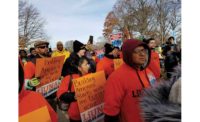The nationwide protests against racial injustice prompted by the death of George Floyd on May 25 have sparked discussion throughout the country about systemic racism and ways to overcome it. As with other parts of American society, construction’s legacy on the issue of race is checkered, with people in the industry experiencing overt racism in its distant—and not-so-distant— past.
Atlanta is one of many cities where protests over racial injustice have recently occurred. It’s also a city where two different entities—Black-owned contractor H.J. Russell & Co., and the Construction Education Foundation of Georgia—are striving to recruit more Black men and women into the construction industry.
ENR spoke to leaders of both groups about those efforts.
“Step Up and Speak Up”
For Michael B. Russell, CEO of H.J. Russell & Co., a large, Atlanta-based contractor founded in 1952 that remains Black-led, success in the construction industry requires a commitment to taking “deliberate” action. That’s a word he uses frequently, whether talking about minorities working their way into a construction career, or the industry’s efforts to recruit a more diverse workforce.

Russell believes that the construction industry in general, and his firm in particular, can make greater efforts than it does, not only by doing a better job of recruiting African Americans into the industry, but also of supporting Black-owned contractors and suppliers.
In a statement posted June 6 on the contractor’s website addressing “the atrocities that have plagued the Black community for decades,” Russell wrote: “The Russell family and our various businesses will do all we can to facilitate and advance honest, transparent and effective dialogue that we hope will help bring about continuing solutions and ultimately, lasting change.”
“We're already diverse,” Russell says of his own company, noting the firm’s recruitment of future employees from nearby Georgia Tech, but also from historically black colleges and universities throughout the region, such as Tuskegee University and North Carolina A&T University. Majority-owned firms “have to do the same thing,” he says. “It's important that a lot of these (majority-owned) companies become more deliberate in helping to diversify their own ranks.
“We need quality people in the industry, and we can’t get caught up in what they look like,” Russell says. “We need to get good quality people and the industry needs to continue to do a better job to reach out to more diverse audiences and find a way to make the industry more inviting for diverse people.” Working harder to create a more diverse workforce isn’t just a practical matter, but a moral imperative, he adds.
Racism “is something that people shouldn’t be afraid to discuss,” Russell says. “Silence means you’re complicit with where we are today. If you really care about things getting better, you have to be willing to step up and speak up. That’s my message.”
“Funnel Has to Be Bigger”
Scott Shelar, foundation president and CEO, thinks many more cities across the country should have something akin to Atlanta’s Construction Ready program. Started in 2014 with a goal of training at-risk youth in the city’s Westside neighborhood for jobs in the construction industry, the program now operates via three additional centers in other disadvantaged neighborhoods.
Citing figures from the federal Bureau of Labor Statistics, Shelar says that while African-Americans comprise roughly 12% of the U.S. workforce, the proportion is just 6% in the construction industry.
“It's not enough; we’ve got to do more as an industry,” Shelar says. “We should have Construction Ready programs all over the country reaching out to African-American communities and training people and getting more people into our industry—not only for moral reasons, but for practical reasons.”
Founded in large part with $15 million from the Arthur M. Blank Family Foundation, Construction Ready recently marked the milestone of its 1,000th graduate.
The program uses a month-long “boot camp-style” approach to training local residents. The group started out training roughly 20 students per month but is now educating between 40 and 60 students a month, according to Shelar. Based on his experience with the program, Shelar sees that, as a whole, the national construction industry’s current outreach efforts aren’t sufficient.
The key to Construction Ready's success, Shelar says, is its approach of working with local community-based nonprofit organizations that help to recruit local residents into the program. "So there's trust there," he says.
Overall, says Shelar: “The top of the funnel has to be bigger. And the only way you make the top of the funnel bigger is to reach out to groups of people that we haven’t reached out to before.”





